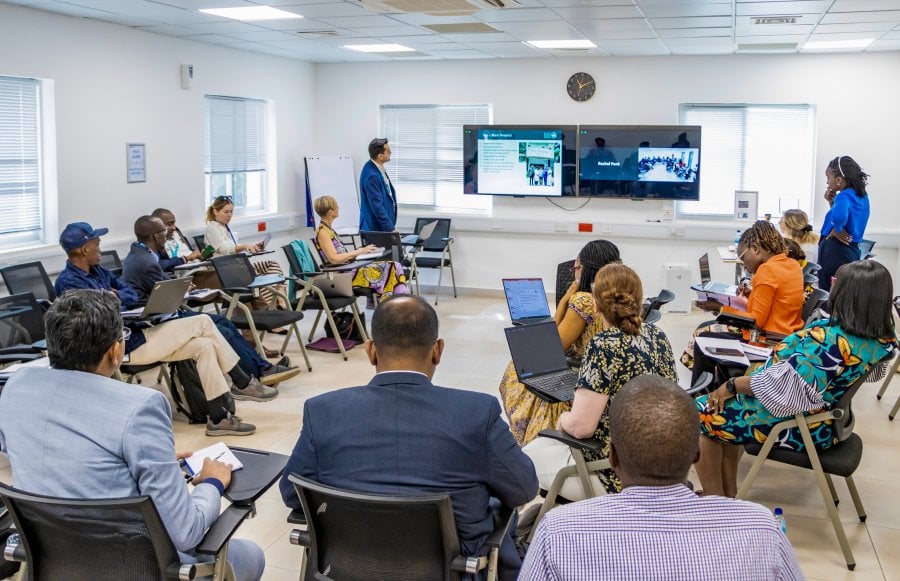
Group meeting in a hall
The Get Ready, Get Real project envisions advancing the safe introduction of vaccines for pregnant women globally and will collect critical background information on pregnancy and infant outcomes over 18 months. The cross-sectional primary and secondary data extraction initiative will span six Low- and Middle-Income countries (LMIC).
The project addresses the gaps in maternal immunisation strategies and the challenges of integrating new vaccines into antenatal care systems by seeking to empower participants, involve their spouses, improve child health outcomes, and contribute to developing actionable strategies and the safe introduction of vaccines for pregnant women globally.
Beate Kampmann, Professor of Paediatric Infection & Immunity and Chief investigator, highlighted the project's significance for pregnant women in The Gambia.
"The Get Ready -Get Real Project is trying to establish how we can best implement vaccines for use in pregnancy in an environment where there is little baseline data on pregnancy outcomes, and the records of mothers and their babies are not in any way combined. When introducing vaccines into this period of life, we need to look for the logistical challenges and ensure all proceeds safely."
She added, "We need to have good, preferably electronic, records of pregnancy outcomes, particularly adverse outcomes of special interest. These data will give us important background rates for common unfortunate pregnancy outcomes such as prematurity, stillbirths, and maternal and neonatal deaths before any new vaccines are introduced. They also let us assess when women access antenatal care services, which matters when we are planning to administer vaccines at specific time points during the pregnancy."
The project was designed in collaboration with the Ministry of Health and the EPI system, aiming to link data from mothers and babies together and make them easily accessible.
The data collected during the study are needed to monitor the regularity and quality of care for pregnant women in the countries where the project will be implemented. Therefore, the project works closely with the Ministries of Health, as well as the Maternal and Child Health Department and EPI in The Gambia. By developing methods to collect these data more conveniently, like using Smart Paper Technology (SPT), the goal is to contribute to improved care for pregnant women and their babies as pregnancy outcomes can be more easily captured and the data link between mothers and their offsprings.
Oluwatosin Nkereuwem Principal Investigator for The Gambia site, the leading site for the Get Ready, Get Real project said that, data from all sites in all 6 countries are collected into a central database using unique site codes with the same data collection tools. The overall joint data management run from the MRCG at LSHTM ensures a quality data set, as this forms an integral part of the success of this study.
“As the lead site, we developed a uniform data collection platform where all the data is collected to enable a comprehensive data analysis and summary report following each phase of the study.”
Ugochukwu Madubueze, a Public Health Physician at the National Obstetric Fistula Centre - in Nigeria and Suraj Bhattarai, a Clinician Researcher at Global Health Research & Medical Interventions for Development (GLOHMED)based in Nepal, emphasised the importance of engaging stakeholders on maternal vaccination to enhance data capture and linkages and ensure comprehensive healthcare delivery.
Mir Mobarak Hoassain, a Public Health Doctor from Bangladesh, highlighted the significance of participating in this meeting and expressed his intention to discuss the findings with policymakers in Bangladesh to drive national health policy strategies. He plans to implement a pilot program based on their advice to assess its effectiveness in his country.
Dan Kajungu, a Research Scientist from the Makerere University Centre for Health & Population Research- Uganda, highlighted the importance of synthesising data from the study to inform decisions on maternal vaccine deployment, he said:
"Synthesis of data from this study guides our decisions on the need to reach every woman at the appropriate gestational age to achieve effective impact."
If you enjoyed this article and would like to build a career in global health, we offer a range of MSc programmes covering health and data, infectious and tropical diseases, population health, and public health and policy.
Available on campus or online, including flexible study that works around your work and home life, be part of a global community at the UK's no.1 public health university.
